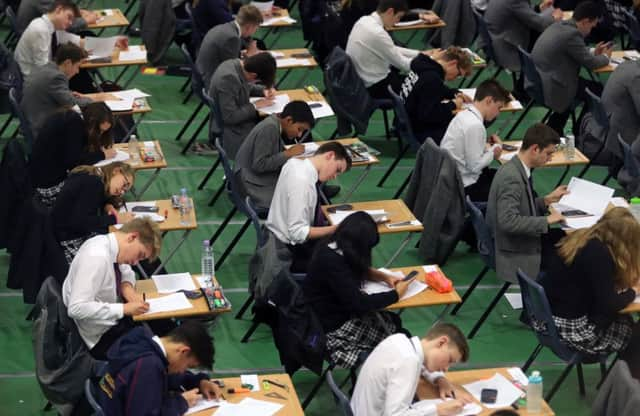Why exam season is not just about A-Levels and GCSEs - Hannah Buttle


This year’s cohort were not only the first full year group to take on the more challenging A-level in maths but were also the first to take the 9-to-1 grade English and maths GCSEs.
Advertisement
Hide AdAdvertisement
Hide AdWhile there has been little change in results, there are still signs that students have felt the effects of the recent upheaval.


Firstly, and most notably, this year we’ve seen a big dip in maths entries at A-level by six per cent – the first decline in entries for many years.
This dip in maths is partly a result of a fall in the 18-year-old population, but the new, harder, GCSEs may have also played a role, putting off some students from continuing their studies. In the years ahead, the knock-on effect of these tougher GCSEs could shape A-level choices.
Advertisement
Hide AdAdvertisement
Hide Ad

What else have we learned?
One surprise is the fall in those achieving the very top grades. Maths always leads the A*-A range, and, with weaker candidates steering clear this year due to the tougher GCSEs.
Maths scores were expected to boost the overall proportion of those hitting the highest grades at A-level. In fact, the number of top grades in Maths has fallen.
Girls continue to outperform boys in terms of A*-B grades and overall passes, but boys are still more likely to get A*-A grades, though the gap in top grades has closed slightly this year. While gender divides persist, there has been a welcome move towards a more even picture when it comes to subjects and grades.
Advertisement
Hide AdAdvertisement
Hide AdFor the first time, girls now make up half of entries in the core science subjects of biology, chemistry and physics, though there is some way to go for maths entries.
In terms of A*-B grades, boys continue to outperform girls in chemistry and maths, with the gap in maths widening slightly, while girls still have the edge in biology and physics.
Despite the gender divide, we have seen an overall rise in sciences and maths to a third of all A-Levels.
This will be welcomed by many, given the country’s science, technology, engineering and maths (STEM) skills shortage.
Advertisement
Hide AdAdvertisement
Hide AdHowever, the rise in STEM A-Levels is unlikely to be enough for many STEM employers, nine out of 10 of whom state that they face difficulties recruiting qualified staff.
The rise in STEM, and in the social sciences, with subjects such as political studies, may have come at the cost of sharp falls in other subjects, such as English.
Given that the UK already has one of the narrowest curricula out of all developed nations, the continued narrowing of subjects may raise concerns about whether we’re equipping students for the future.
There was also been much noise around unconditional university offers in the run-up to this month’s results, which now make up eight per cent of all offers compared to one per cent in 2009.
Advertisement
Hide AdAdvertisement
Hide AdDepending on the response from universities and the government over the next year, there’s a reasonable chance that trends could slow or reverse next summer.
Beyond these trends, one of the most important takeaways is that the focus is heavily skewed towards those students who progress from A-levels to university.
Little attention has been paid to those who opt for alternative education routes – or indeed that those don’t take A-levels.
Students taking vocational qualifications such as BTECs are on the rise, particularly among those from poorer backgrounds.
Advertisement
Hide AdAdvertisement
Hide AdAt the same time, many post-16 education institutions are under acute funding pressure, following declines in real terms funding per student that are twice as great as the funding shortfalls in schools.
The publication of exam results is a chance to celebrate success, and the outstanding achievements of many students.
But, at a time of increasing segregation between rich and poor after GCSE, and stalling social mobility, we should consider the half of young people who take a different path, and champion their achievements too.
Hannah Buttle is a researcher at the Education Policy Institute (EPI).